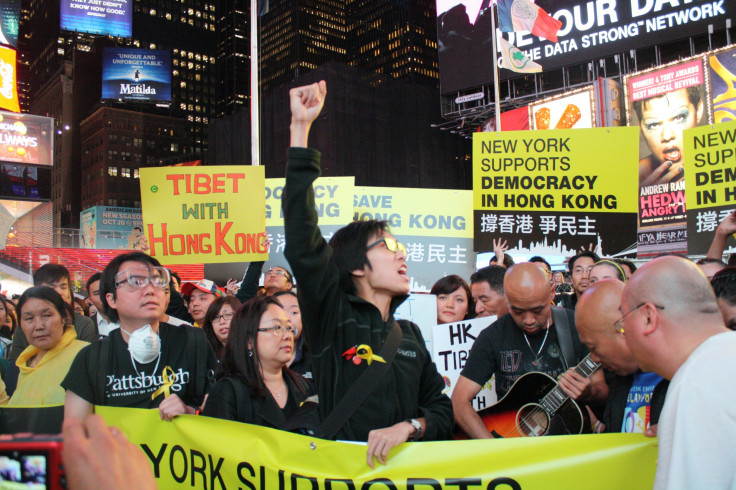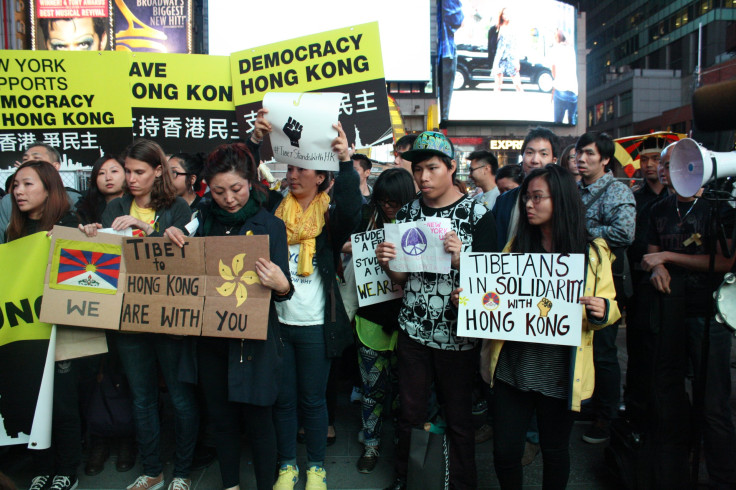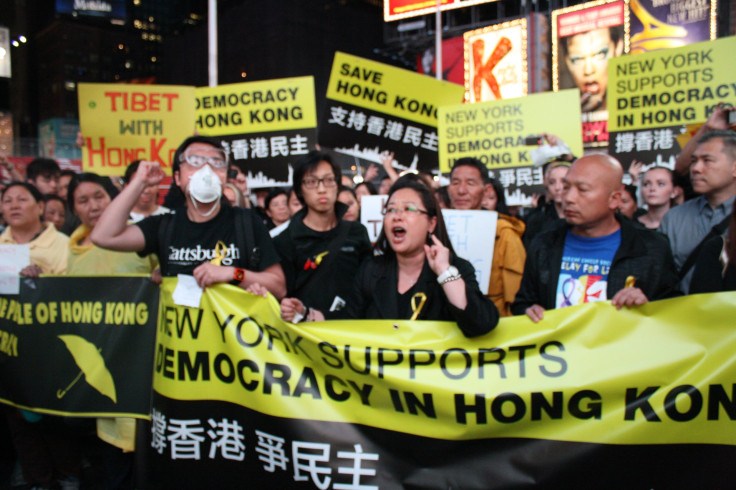Occupy Central Protests In New York: Tibetans Voice Support For Hong Kong Protesters

Though not a drop of rain was falling, a sea of umbrellas, now a recognized symbol of Hong Kong’s pro-democracy movement, appeared under the lights of Times Square at 8 p.m. on Wednesday night. While tens of thousands of protesters in Hong Kong braved the rain and thunder on Oct. 1, China’s National Day, a smaller, but equally passionate group of pro-democracy activists gathered in New York City as an act of solidarity.
At the Support Hong Kong Umbrella Rally, New York’s Hong Kong transplants and their supporters addressed a crowd of onlookers, media and protesters about Hong Kong’s fight for greater political freedom. The crowd was far smaller than the masses seen in Hong Kong, but the movement has gained some traction overseas, with rallies for support held in Europe and North America. In the crowd in New York, there was also a group of people who have their own fight with the Beijing government: Tibetans, and their U.S. supporters.

A Tibetan student wishing only to be identified as Jamyang, who came along with a classmate originally from Hong Kong, said, “I honestly don’t know the particulars of Hong Kong’s history, but I am learning from my friend. But I do know this is an issue that I think as a Tibetan I can sympathize with greatly. This isn’t the voice of just Hong Kong, this is the voice of the many people being oppressed by China’s government.”
“In London as well as New York, Tibet supporters joined Hong Kong solidarity protests, and another rally also took place in Dharamsala, India, which has the largest exile Tibetan community in the world and is where the Central Tibetan Administration and the Dalai Lama are based,” Alistair Currie, a spokesperson for Free Tibet, noted via email. “Tibet supporters stand in solidarity with pro-democracy campaigners everywhere and hope that events in Hong Kong will help the Chinese government to learn that protest is an opportunity for change rather than a threat.”
“Hong Kong may yet open a door for the Tibetan people to walk through -- and China should not be afraid of that,” he said. Many in Tibet, which China occupied in the 1950s, demand an end to what they see as marginalization and religious and cultural repression of ethnic Tibetans by Han Chinese.
“Many young people in Hong Kong are pessimistic about the future. … Hong Kong is completely controlled by a very small group of very rich men, the tycoons. They dominate the political system. The analogous electoral situation in the U.S. would be [like] if Goldman Sachs and Walmart elected the President,” Rico Fung, an Australian-born Hong Konger, currently a junior at the University of Chicago, said.
“The frustration of being abroad at such a pivotal time for Hong Kong is partly why there have been so many solidarity events organized in the U.S. and around the world,” Fung, who is visiting New York for a Model United Nations conference with his university, said. “Almost universally, fellow Hong Kongers studying abroad support the protesters, and I don’t know anybody who doesn’t want democracy.”
Though there have been moments of tension in Hong Kong, particularly after protesters were tear-gassed, the New York rally stressed the importance of peaceful protest. “I hope this will end-- we don’t want any violence. We want to end in a peaceful way, we want to go back to work and go back to school. We want this to end,” Anna Cheung, a professor at Manhattanville College and the unofficial organizer of the Occupy movement’s New York activities, said in a telephone interview.

“I haven’t really slept, I lost my voice, and I’m breaking my own record by holding three rallies in just one week,” Cheung said. “I don’t know how long it will take, but I’ve been doing this for a long time and I will continue.”
In fact, Cheung began her activism long before the birth of the Umbrella Movement. “Twenty-five years ago, during the Tiananmen Square protests, 100,000 of us went marching in Hong Kong peacefully to support Beijing’s students,” Cheung said ahead of the rally. Hong Kong was then a British colony, and wasn't handed over to China until 1997, under a system in which the city's chief executive would be selected by Beijing, not elected by Hong Kongers.
“Now we hope Beijing people will support us.”
© Copyright IBTimes 2024. All rights reserved.






















